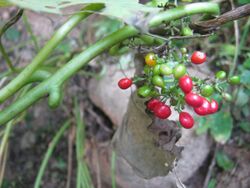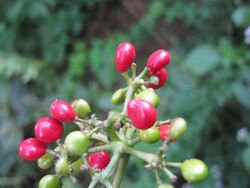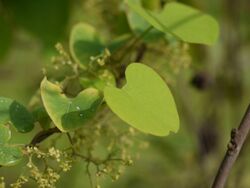Biology:Cissampelos pareira
| Velvetleaf | |
|---|---|

| |
| Cissampelos pareira with bulb and fruits found in Panchkhal, Nepal | |
| Scientific classification | |
| Kingdom: | Plantae |
| Clade: | Tracheophytes |
| Clade: | Angiosperms |
| Clade: | Eudicots |
| Order: | Ranunculales |
| Family: | Menispermaceae |
| Genus: | Cissampelos |
| Species: | C. pareira
|
| Binomial name | |
| Cissampelos pareira | |
Cissampelos pareira (velvetleaf)[1] is a species of flowering plant in the family Menispermaceae.
Morphology
It is a slender tomentose climber. The leaves are peltate, 2.5–12 cm long, 2.5–11.5 cm broad, triangularly broad-ovate, or orbicular, obtuse, mucronate, base cordate or truncate, ± tomentose on both sides; petiole pubescent. Flowers are small in size, pedicels filiform. Male flowers clustered in the axil of a small leaf; sepals are 4 in number, obovate-oblong, hairy outside; petals 4 in number, united to form a 4-toothed cup, hairy outside; stamens 4, column short, anthers connate, encircling the top of the column. Female flowers clustered in the axils of orbicular, hoary imbricate bracts, on 5–10 cm long racemes; sepal 1, petal 1; carpel 1, densely hairy; style shortly 3-fid. Drupe 4–6 mm long, 3–4 mm broad, subglobose, compressed, hairy-pubescent, red when fresh, black when dry, endocarp transversely ribbed, tuberculate. Seeds are horseshoe-shaped.[2]
Medicinal uses
Cissampelos pareira is used in Chinese herbology, where it is called xí shēng téng (Chinese: 锡生藤) or yà hū nú (Chinese: 亞乎奴). The species is also known as abuta and called laghu patha in Ayurvedic medicine. In Tamil Nadu it is called ponmusutai and it is used for a number of medicinal purposes.
Some attention has been paid to it in Kenya, Tanzania, and other places for its purported antimalarial properties in particular,[3][4] as well as in India for its antiviral properties, especially against Dengue virus.[5]
See also
References
- ↑ 1.0 1.1 {{citation | mode = cs1 | title = Cissampelos pareira | work = Germplasm Resources Information Network (GRIN) | url = | publisher = [[Organization:Agricultural Research ServAgricultural Research Service (ARS), United States Department of Agriculture (USDA) | access-date = 2008-02-05 }}
- ↑ "Velvetleaf - Encyclopedia of Life". http://eol.org/pages/594912/details.
- ↑ Muthaura, C.N.; Rukunga, G.M.; Chhabra, S.C.; Mungai, G.M.; Njagi, E.N.M. (2007). "Traditional phytotherapy of some remedies used in treatment of malaria in Meru district of Kenya". South African Journal of Botany 73 (3): 402–411. doi:10.1016/j.sajb.2007.03.004.
- ↑ Taylor, Leslie (1996). "Tropical Plant Database entry for: ABUTA – Cissampelos pareira". http://www.rain-tree.com/abuta.htm#.U86bdfldV1A. Retrieved 2014-07-22.
- ↑ Beasley, David W.C.; Sood, Ruchi; Raut, Rajendra; Tyagi, Poornima; Pareek, Pawan Kumar; Barman, Tarani Kanta; Singhal, Smita; Shirumalla, Raj Kumar et al. (2015). "Cissampelos pareira Linn: Natural Source of Potent Antiviral Activity against All Four Dengue Virus Serotypes". PLOS Neglected Tropical Diseases 9 (12): e0004255. doi:10.1371/journal.pntd.0004255. PMID 26709822.
External links
Wikidata ☰ Q3291604 entry
 |



